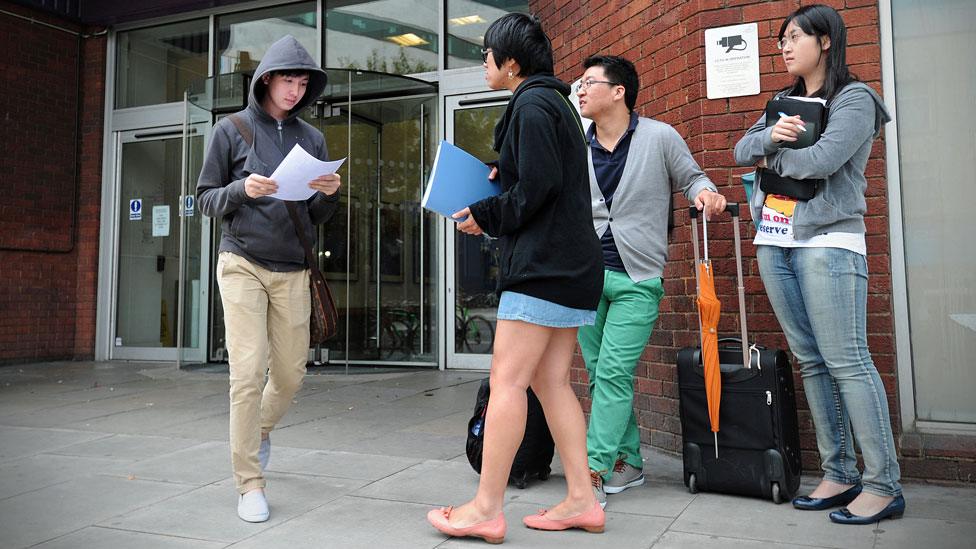Overseas students should 'stay in migration target'
- Published

Universities are disappointed at the lack of change in the approach to overseas students
International students in the UK should not be removed from targets to reduce migration, recommends a report commissioned by the Home Office.
The Migration Advisory Committee, which gives the government independent advice on immigration, says there is no clear case to support such a change.
But the report calls for an easier move into work for overseas students.
Universities UK, which lobbied for students to be treated differently, said it was "disappointed"
The study, commissioned by the Home Office in August 2017, says there should continue to be no cap on international student numbers - and that they brought in extra money, skills and "soft power" to the UK.
"International students bring clear benefits to the whole of the UK," says committee chairman Professor Alan Manning.
He said their fees provided a "cross-subsidy" for home students, they boosted the quality of research and their spending helped to support local economies.
'No accurate way'
But Prof Manning's report says that if the target remains to reduce migration to the tens of thousands, there is no practical way of removing students from the total.
He said that no one had come up with an "accurate and simple way that it could be done".
The report says there are more than 750,000 international students coming to the UK each year - a mix that includes undergraduate and postgraduate university students, further education, private school and language students on short courses, some of whom might move on to work visas.
Prof Manning rejected the idea that these students could be unpicked from the numbers of those arriving and leaving the country.
In the report, Prof Manning said: "If there is a problem with students in the target, it is with the target itself rather than the inclusion of students in the target," the report said.
He also warned Brexit offered "no upside" to universities wanting to recruit international students - and suggested that EU students coming to the UK in the future could have a visa status needing reduced documentation.
'Woefully disappointing'
The committee recommends that it should be easier for some international students to be able to move from a student visa to a work visa at the end of their studies.
But it rejected the idea of a separate post-study work visa proposed by Universities UK last week, which suggested that international students should be able to remain and work in the UK for two years after graduation.
Universities have called for a more welcoming approach to international students, in which they would be treated separately from other migrants.
There have been warnings that the £26bn brought to the UK economy by international students if they choose to study elsewhere, with growing competition from the United States, Australia and Canada.
Nick Hillman, director of the Higher Education Policy Institute, said the report was "woefully disappointing".
"It hinders growth because it suggests the government is not truly committed to an increase in international student numbers and it does so at the very moment when our key competitors are extending their market share fast," said Mr Hillman.
Janet Beer, president of Universities UK, said: "While the UK continues to count international students as long-term migrants in its net migration target, there is a continued pressure to reduce their numbers. This adds to the perception that they are not welcome here."
'Puts this issue to bed'
But Lord Green, chairman of Migration Watch UK, welcomed an "excellent report".
He said the committee's "endorsement of the inclusion of students in the migration statistics should put this issue to bed".
Lord Bilimoria, co-chair of the All Party Parliamentary Group for International Students, said: "It is so weak in its recommendations, it would not be surprising if it were to be perceived to not be completely independent, given that its recommendations are completely at odds with almost 2,000 pages of evidence, provided by over 100 institutions."
James Pitman, speaking for the Destination for Education coalition of businesses involved in teaching overseas students, warned: "Maintaining the status quo will do nothing to restore Britain's leadership in education exports. Our international competitors will continue to outperform us."
Gordon Marsden, Labour's shadow higher education minister, said he was "extremely disappointed" that the committee had not recommended removing students from migration targets, "despite overwhelming evidence in favour".
Jane Gratton of the British Chambers of Commerce said: "It's time to scrap the caps and arbitrary numerical targets. It's one thing to control migration, but quite another to use arbitrary mechanisms that deny businesses, universities and the public sector employers the people they need to address immediate skills gap."
A Home Office spokesman said: "As this report makes clear, international students play an important and positive role in our education system, economy and society.
"We are committed to ensuring we continue to attract the best international students."